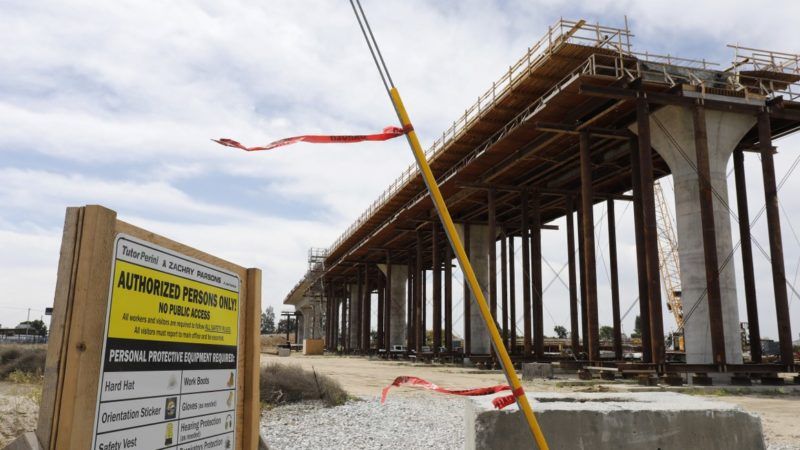Even the Coronavirus Might Not Be Able to Kill California's Bullet Train Boondoggle
As the state deals with budget cuts and deficits, some boosters still fight to keep construction going.

California's response to the spread of COVID-19, which included almost completely shutting down entire sectors of the economy, has devastated the state's bottom line, requiring billions in budget cuts and potentially draining the state's $16 billion "rainy day" fund.
One might think that such a fiscal disaster would cut through the institutional inertia keeping California's $80 billion bullet train boondoggle active and kill it off for good. But the reality is that even amid a new recession (possibly a depression) and a $54 billion deficit, and despite story after story about the project's mismanagement, the bullet train plan is still somehow chugging along.
A few vultures are circling overhead. Lawmakers—yes, Democratic lawmakers in this one-party state—seem to be coming to terms with the fact that a decline in state revenue doesn't match well with the regularly increasing price tag for a cross-state bullet train, currently under construction in the Central Valley. In June state Assembly members introduced a resolution that would tell the California High Speed Rail Authority (CHSRA) that it needs to defer signing a massive new contract to install 171 miles of new track and implement a 30-year service agreement until lawmakers actually appropriate more money to the project to cover those costs. The resolution passed the Assembly on June 11 by a vote of 63-0. While the resolution doesn't legally prohibit the CHSRA from pushing forward, it's a big warning flag to that body that the Assembly might not come through with the actual money to back up any contracts that are signed.
There's more: In late May, the Los Angeles Times reported that according to consultants to CHSRA, if and when the bullet train starts starts carrying travelers, it will lose money and will require operational subsides by the state.
This would seem to be a massive problem. The ballot initiative passed in 2008 authorizing bonds for the bullet train specifically states that it will not require an "operational subsidy"—no additional local, state, or federal government money can be used to keep the trains going. But according to an independent business analysis by accountants KPMG and Deutsche Bahn, a German rail company, the first operating train line in central California could lose between $40-90 million a year.
None of this should come as a surprise to the bullet train's biggest critics. From the very start, analysts for the Reason Foundation (the nonprofit which publishes this website) have been predicting that the train will require operational subsidies that will eventually reach hundreds of millions annually.
The huge economic downturn has also threatened other sources of funding for the bullet train. As Reason Foundation Senior Policy Analyst Marc Joffe noted earlier in June, money from cap-and-trade auctions in California plunged from $613 million in February to a mere $25 million in May. A quarter of this money is used to fund the bullet train project.
Even though state operational subsidies would technically violate the terms the voters approved, bullet train proponents are trying to weasel out of the problem by turning over operations from CHSRA to another government agency, possibly the San Joaquin Joint Powers Authority. Needless to say, changing who operates the train doesn't erase in any way the reality that the bullet train will be getting government subsidies to operate, and the Legislative Analyst's Office warned earlier in the year that this switch appears to be inconsistent with the "spirit" of the ballot proposition approved by voters.
"Whatever California is going to get from this project, it is not what voters approved in 2008," says Joffe. "The legislature should put a new, more realistic transportation plan in front of voters. This should include finishing the 111-mile segment under construction but not electrifying it. Rather than extending it further to the north and south, it could just be connected to the existing line that provides Amtrak service in the Central Valley."
As part of his presidential campaign, Joe Biden is promising to expand high-speed rail across the country, claiming that it will get "millions of cars off the road." Of course, that's not what high-speed rail actually does. As its more realistic proponents will admit, bullet trains compete with airlines, not with highways. But Biden's impractical plan is likely to inspire some bullet train boosters in California to hold out hope for a federal bailout if Biden is elected in November.


Show Comments (59)